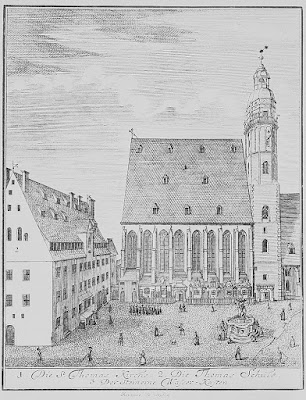 |
| St Thomas' Church, Leipzig in 1723 |
Reviewed 31 December 2022 (★★★★½)
The Dunedin Consort rings out the old year with a pair of elaborate, festive cantatas by Bach
John Butt and the Dunedin Consort's final concert of 2022 at Wigmore Hall featured two of Bach's larger-scale cantatas, each written for the Christmas period, one during the Weimar years and one from Leipzig. Both included trumpets and drums (as well as flutes and a range of oboes) and were suitably festive, yet full of imagination, whilst the concert opened with a sinfonia by Bach's older, Vienna-based contemporary Antonio Caldara (in a new edition by Adrian Chandler).
Caldara has got something of a bad press because he was the Hapsburg Emperor's house composer, and even during his lifetime his works were not always highly promoted; once performed the manuscripts could disappear into the Imperial library. The Sinfonia in C featured an upbeat, brilliant Allegro with trumpets, full of wonderful writing, then a rather Handelian middle movement, before the lively concluding Allegro, full of a delightful bounce.
Bach wrote Unser Mund sei voll Lachens, BWV110 for Christmas Day in Leipzig in 1725. It is a large-scale, grand work and this is reflected by the overture which re-cycles a movement from the Orchestral Suite No. 4, with Bach bringing the chorus in during the lively middle section. The Dunedin Consort used eight singers standing at the front of a very full stage and the lively choral section, taken at quite a lick, took time to settle down, and intriguingly the concluding section of the movement returned to orchestra alone.
Hugo Hymas' aria featured a lyrical yet busy tenor line with two beautifully burbling flutes, then a short but dramatic recitative from baritone Robert Davies led to James Hall's aria with Hall's thoughtful and considered alto solo complemented by a busy oboe d'amore, and Hall's contribution developed in intensity as the aria progressed, as he considered how Hell and Satan surround Christ. There followed a delightfully busy duet for soprano Jessica Cale and Hugo Hymas, the text simply 'Glory to God in the highest, and on earth peace, good will toward men!'. The final aria featured Robert Davies, in robust, vigorous form, complemented by some brilliant trumpet playing. After the festive brilliance of the opening chorus, the concluding chorale was suitably sober with thoughtful words.
Bach's cantata Christ, ätzet diesen Tag, BWV63 is less clear-cut in its aims. It was probably composed in Weimar in 1713 or 1714, and was performed on Christmas Day in Leipzig in 1723. It is undoubtedly festive and grand, but its music is not that Christmassy. The text has links to theologians in Halle and it may be connected to Bach's attempt to get a job there. Also, the work lacks a chorale and is in fact highly structured with a conscious symmetry of the movements.
It began with a brilliant and vigorous chorus that Butt took with a swing, then there was a long, thoughtful and remarkably substantial recitative for James Hall, who gave an impressively powerful performance. Next came a duet for Jessica Cale and Robert Davies, though the presence of a substantial oboe solo meant it was really a rather striking trio, with just continuo accompaniment. Hugo Hymas' recitative led to a lively duet for him and James Hall, which seemed a rather perky dance. Robert Davie's dramatic recitative led to the final, festive chorus, the vigorous writing featuring trumpets and drums.
Never miss out on future posts by following us
The blog is free, but I'd be delighted if you were to show your appreciation by buying me a coffee.
Elsewhere on this blog
- 2022 in Record reviews - record review
- 2022 in Concert reviews - concert review
- 2022 in Opera and Music Theatre reviews - opera review
- Music for a video game must serve the players' actions: Olivier Deriviere talks about writing music for A Plague Tale: Requiem - interview
- O splendor gloriae: The Tallis Scholars at St John's Smith Square Christmas Festival - concert review
- A daring and refreshing project: 12 composers, 12 different approaches - Carols after a Plague from The Crossing - record review
- In fine fettle: conductor Maxim Emelyanychev brings an interesting element of period style to the latest Magic Flute revival at Covent Garden - opera review
- Natalya Romaniw, Freddie De Tommaso, & Erwin Schrott in Puccini's Tosca at Covent Garden - opera review
- A lovely way to begin the Christmas season: Handel's Messiah from Laurence Cummings & Academy of Ancient Music at Barbican Centre - concert review
- Making ancient music sound modern: Franck-Emmanuel Comte on Le Concert de l'Hostel de Dieu's mixing old & new music, collaborating with beatboxers, hip-hop and more - interview
- 20 Christmas pieces by 19 women composers from the 20th and 21st centuries: Somerville College Choir's The Dawn of Grace - record review
- To enter White's world is to enter a parallel universe: Alastair White's opera Rune recorded live on Metier - record review
- Home











No comments:
Post a Comment